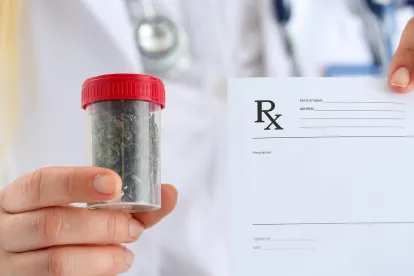West Virginia Governor Jim Justice signed legislation that legalizes the use of marijuana for medicinal uses on April 19, 2017. The new law, Senate Bill 386, known as “The West Virginia Medical Cannabis Act,” permits patients suffering from serious medical conditions including cancer, ALS, HIV/AIDS, multiple sclerosis, Parkinson’s disease, epilepsy, neuropathies, Huntington’s disease, Crohn’s disease, post-traumatic stress disorder, intractable seizures, sickle cell anemia, severe chronic or intractable pain, or certain spinal cord damage to use marijuana for medicinal use. Medical marijuana only may be dispensed in the following forms: pill, oil, topical forms (including gel, creams or ointments), vaporization or nebulization, tincture, liquid or dermal patch. Smoking marijuana is not permitted under the law.
Although most provisions of the law took effect immediately upon passage, no identification cards will be issued to patients until July 1, 2019.
There are several provisions in West Virginia Medical Cannabis Act that impact employers. First, there is a broad anti-discrimination provision:
No employer may discharge, threaten, refuse to hire or otherwise discriminate or retaliate against an employee regarding an employee’s compensation, terms, conditions, location or privileges solely on the basis of such employee’s status as an individual who is certified to use medical cannabis.
However, employers need not accommodate the use of marijuana at work, and may discipline employees who are “under the influence” of marijuana at work:
Nothing in this Act shall require an employer to make an accommodation of the use of medical cannabis on the property or premises of any place of employment. This Act shall in no way limit an employer’s ability to discipline an employee for being under the influence of medical cannabis in the workplace or for working while under the influence of medical cannabis when the employee’s conduct falls below the standard of care normally accepted for that position.
Nothing in this Act shall require an employer to commit an act that would put the employer or any person acting on its behalf in violation of federal law.
The law also does not permit any person to engage in and does not prevent the imposition of any civil, criminal or other penalty for the following:
Undertaking any task under the influence of medical cannabis when doing so would constitute negligence, professional malpractice or professional misconduct.
Additionally, the law prohibits the following in certain safety-sensitive jobs:
A patient may not operate or be in physical control of any of the following while under the influence of marijuana with a blood content of more than 3 ng/ml: (1) chemicals which require a permit issued by the federal government, state government, federal agency or state agency; (2) high-voltage electricity or any other public utility; (3) vehicle, aircraft, train, boat or heavy machinery;
A patient may not perform any employment duties at heights or in confined spaces, including, but not limited to, mining while under the influence of medical cannabis.
A patient may be prohibited by an employer from performing any task which the employer deems life-threatening, to either the employee or any of the employees of the employer, while under the influence of medical cannabis. The prohibition shall not be deemed an adverse employment decision even if the prohibition results in financial harm for the patient.
A patient may be prohibited by an employer from performing any duty which could result in a public health or safety risk while under the influence of medical cannabis. The prohibition shall not be deemed an adverse employment decision even if the prohibition results in financial harm for the patient.
While these provisions appear to benefit employers who operate safety-sensitive workplaces, they also raise a number of questions which are not answered by the statute, including, what is the definition of “under the influence of marijuana”? While most employers rely on urine testing for drugs, the active ingredient in marijuana still can show on a urine drug test days or even weeks after use (depending on the frequency of use).
Employers with operations in West Virginia should review their drug and alcohol policies and consult with counsel to determine how they will address these issues.




 />i
/>i

